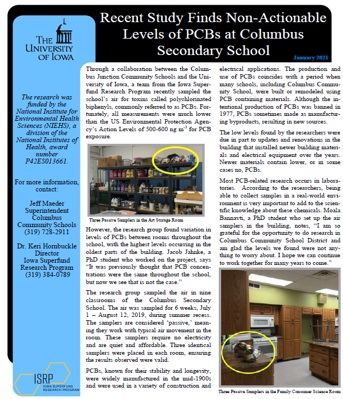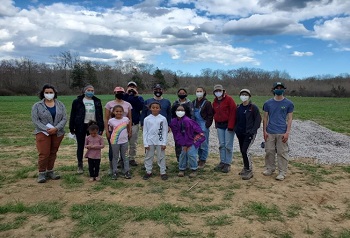Superfund Research Program
July 2021
When in-person events, classes, and research activities were put on hold due to the coronavirus disease 2019 (COVID-19), NIEHS Superfund Research Program (SRP)-funded trainees got creative and identified unique opportunities to pursue safely during the pandemic. With support from their mentors, SRP trainees gained experience across multiple scientific fields, conducted research in a collaborative environment, and engaged with diverse stakeholders and community members.

Janhke and Bannavti placed the samplers in the school July and August 2019 and analyzed the results.
(Photo courtesy of University of Iowa SRP Center)
Creative Community Outreach
University of Iowa SRP Center trainees, Jacob Jahnke and Moala Bannavti, created a one-page flyer to communicate the results from testing for polychlorinated biphenyls (PCBs) at an Iowa high school. Jahnke and Bannavti reported that all measurements were much lower than what the U.S. Environmental Protection Agency considers levels of concern. Bannavti also created a related YouTube video, which won the University of Iowa Three Minute Thesis competition.
In absence of in-person outreach events, the Northeastern University Puerto Rico Testsite for Exploring Contamination Threats (PROTECT) SRP Center launched a social media campaign, PROTECT Responde, to continue translating their research and educating communities. The campaign shares information about environmental contaminants and their health impacts through Facebook, Instagram, videos, educational materials, and other resources. The materials introduce PROTECT team members, including trainees, who answer complex environmental health questions. The videos, such as this one about COVID-19 and pregnancy, were translated to Spanish by PROTECT trainees.

Brown SRP trainees, researchers, and community members take safety precautions during community volunteer days.
(Photo courtesy of Brown SRP Center)
Brown University SRP Center trainees collaborated with the Rhode Island After School Network to create and distribute over 500 garden enrichment kits to Rhode Island’s youth in need of at-home activities during the height of the COVID-19 pandemic. The trainees also started volunteering at the Narragansett Indian Tribal Farm, where they clear land, prepare greenhouses, and install fencing.
Virtual Training Opportunities
Trainees at the Oregon State University (OSU) SRP Center developed a series of YouTube videos explaining the principles of environmental health and toxicology research to high school students. The videos cover topics from defining environmental exposures to how to design a toxicology experiment, collect data, and analyze and interpret the results.
This year, the Louisiana State University (LSU) SRP Center Dellinger Symposium was held as a fully virtual event through Zoom and iPoster sessions. LSU SRP trainees worked tirelessly to make this event a success. They created banners, flyers, contacted speakers, and identified the Dellinger distinguished lecturer.
The North Carolina State University SRP Center held #PFASComm: Community-based Communication Training and Competition for SRP trainees to improve their science communication and community engagement skills. The virtual event included training webinars focused on communicating complex per- and polyfluoroalkyl substances (PFAS) science to affected communities and an elevator pitch competition.
Trainees at the University of Rhode Island SRP Center planned the PFAS in Our World: What We Know and What We Can Do virtual conference. Trainees explored how the next generation of scientists can rise to meet the challenge of PFAS by leveraging their research to learn more about PFAS in the context of environmental policy, risk assessment, and environmental justice. Lead organizers Heidi Pickard and Alicia Crisalli expressed that the virtual format allowed them to recruit speakers and attendees from around the world, making it a global forum to address a global problem.
Check out the SRP Training page for more information about SRP’s training opportunities. If you have any news of interest to trainees, such as success stories, conferences, or training activities, send them to SRPHealth Scientist Danielle Carlin, Ph.D. (danielle.carlin@nih.gov).


